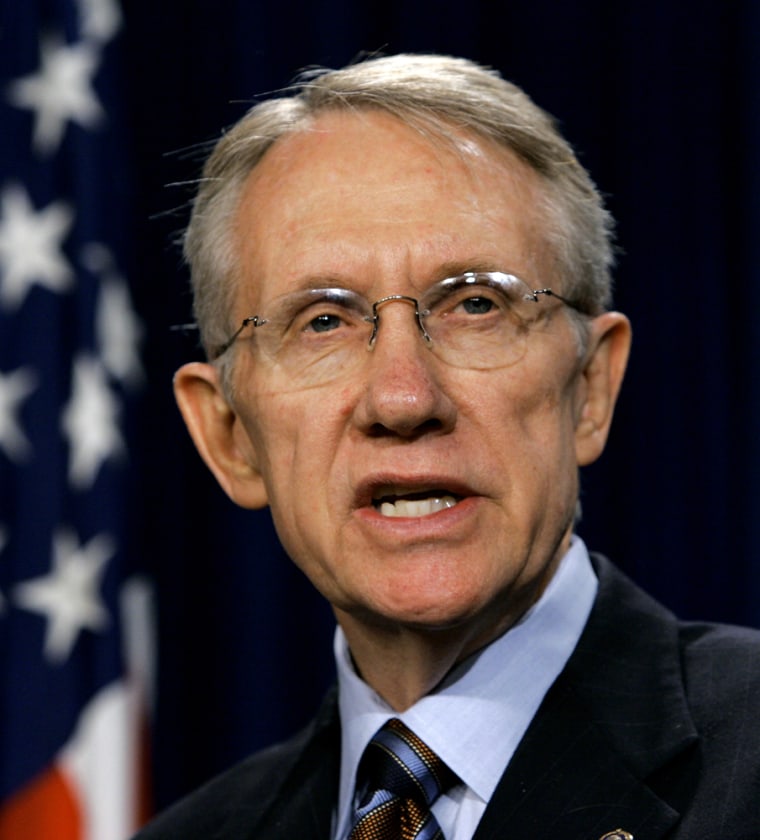In an institution that prides itself as a last bastion of civility, the Senate’s new Democratic leader has on occasion turned to playground taunts and name-calling in his four-month tenure.
After accusing President Bush of lying about his role in a fight over judicial filibusters, Sen. Harry Reid last week called the president a “loser.” And Federal Reserve Chairman Alan Greenspan? He’s a “political hack,” according to the formerly soft-spoken Nevada Democrat.
Reid returned to the Senate floor Monday with a more conciliatory tone and what he called “a gesture of goodwill,” calling for the first time for the confirmation of one of Bush’s appeals court nominees that Democrats blocked in the last Congress.
“Let’s try cooperation, rather than confrontation,” Reid said on the Senate floor. “I would hope that we can let bygones be bygones.”
The Democratic leader’s own words have struck some of the most sour notes in the standoff.
Jab at traveling Bush
One came last week when the lawmaker from Searchlight, Nev., responded to a question about the president’s policies during a high school civics class.
“I think this guy is a loser,” Reid told students in Las Vegas. The reply broke the tradition of withholding negative comments about a president when the commander in chief is traveling on foreign soil. Bush, at that time, was beginning his trip through Europe.
An aide said Reid realized he had overreached and asked White House adviser Karl Rove to pass on an apology to Bush, expressing the senator’s “regret for the comments, that it was inappropriate.”
It wasn’t the first time in Reid’s short time as leader that he targeted Bush in personal terms.
Late last month, Reid complained that Vice President Dick Cheney’s pledge to break a tie if necessary and to vote with Republican leaders to change the rules on filibustering judicial nominees broke Bush’s promise to stay out of the fight.
“Last week, I met with the president and was encouraged when he told me he would not become involved in Republican efforts to break the Senate rules,” Reid said two weeks ago. “Now, it appears he was not being honest, and that the White House is encouraging this raw abuse of power.”
In March it was Greenspan who was the target of Reid’s barbs after the owlish overseer of the world’s largest economy gave a qualified endorsement to Bush’s proposed Social Security and tax reforms.
Interviewed on CNN, Reid called the Fed chairman “one of the biggest political hacks we have in Washington.”
‘Dry wit’ or blood sport?
Reid is no stranger to flashes of anger. In 2003, he spoke on the Senate floor for 8½ hours straight, upset that Republicans were planning to spend 30 consecutive hours talking about four judgeships Democrats had blocked.
“Amateur leadership,” Reid said, assessing Senate Majority Leader Bill Frist, R-Tenn. He later apologized to his GOP counterpart.
Jimmy Ryan, Reid’s aide on the Senate floor for a decade, said the senator “has a very dry wit.”
“I think you guys are just (now) noticing,” Ryan said Monday. “I don’t think we’re seeing anything new.”
For the Senate itself, Reid’s remarks are something of a departure for a body in which civility is its currency. But thrust into a position of prominence by the twin defeats of his predecessor, Sen. Tom Daschle, D-S.D., and Democratic presidential nominee John Kerry, Reid appears to have adopted the strategy that a good offense is the best defense.
“The casualty rate among leaders has been pretty high in recent years,” said Jack Pickney, a professor of government at Claremont McKenna College in California. “In some ways leadership politics has become a personal blood sport. Reid is very much aware that he himself can be a target.”
Reid, 65, served as Daschle’s second-in-command for six years. He was credited for brokering the deal that convinced Sen. Jim Jeffords of Vermont to switch from Republican to independent and give Democrats control of the Senate for most of Bush’s first two years in office. And he has bucked his party on policy, voting for a ban on late-term abortions and against extending the ban on assault weapons. The National Rifle Association has endorsed him.
In his campaign to succeed Daschle, Reid told Senate Democrats he would not allow the minority to be taken for granted.
“I always would rather dance than fight,” Reid said last fall. “But I know how to fight.”
